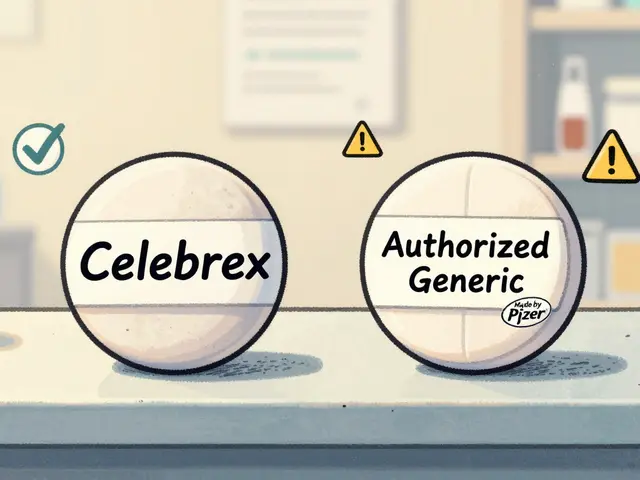Most people have never heard the name 'Depakote' until a doctor scrawls it on a prescription pad. But the moment it enters your world, it takes up space fast. That pill can give hope when seizures won’t let up, when mood swings flip life upside down, or migraines feel like jackhammers in your skull. But no one tells you about the mental tug-of-war that comes with a new med—a cocktail of relief, side-eye glances at the pill bottle, and a barrage of questions. Will this work for me? What if it messes with my mind? Can I live normally on Depakote? Let’s pull back the curtain and talk in plain English about what living with Depakote actually looks like.
What Is Depakote and How Does It Work?
Depakote is the brand name for divalproex sodium, a pill that doctors pull from their toolbox when dealing with tough neurological and psychiatric issues. The key ingredient, valproic acid, has been around since the 1960s. It was first discovered almost by accident, when French researchers noticed a stabilizing effect on animal brains. Fast forward, and Depakote is now FDA-approved for three major things: stopping seizures (especially in epilepsy), balancing mood swings in bipolar disorder, and keeping brutal migraines at bay.
At the scientific level, Depakote calms hyperactive brain circuits. It does this by flooding nerve cells with a soothing neurotransmitter called GABA (gamma-aminobutyric acid). Think of GABA as the brain’s very own chill pill—it slows things down when neurons start firing out of control, like during a seizure or a manic episode. In migraine prevention, Depakote is thought to dial down the brain habits that invite pain signals to crash the party.
Valproic acid isn’t just for adult brains, though. Pediatric neurologists sometimes reach for Depakote to help kids with epilepsy, especially when other meds have struck out. But let’s be clear: while Depakote has a bunch of uses, it’s definitely not for everyone. Doctors have to juggle the benefits with a long list of side effects, drug interactions, and unique risks—especially if you’re pregnant or planning to be.
Who Takes Depakote (and Why)?
So, who actually winds up with a Depakote prescription? The answer covers a wide range of folks. First up, people with epilepsy or other seizure disorders are the big group—especially adults and older kids. According to the Centers for Disease Control and Prevention (CDC), around 3.4 million people in the U.S. have epilepsy. While there are over 20 different seizure drugs, Depakote keeps showing up on “tried and true” lists. It’s especially handy for people who don’t get results from older meds like phenytoin or carbamazepine, or if the side effects from those make life tough.
Bipolar disorder is the other main field where Depakote comes up. If you (or someone you love) live with wild mood swings—sky-high mania one week, deep valley depression the next—mood stabilizers like Depakote can even out those wild rides. Psychiatrists often turn to it when lithium doesn’t do the trick or causes too many problems. In fact, research shows Depakote might work better for patients whose main struggle is mania, irritability, or aggression rather than crushing depression.
Migraine warriors know Depakote, too. Neurologists often suggest it for frequent, disabling migraine headaches that leave you in bed with the blinds closed. Studies published in "Headache" (the journal, not the symptom) show Depakote can slash the number of migraines per month in half for a good portion of users, which is big if your life feels ruled by pain. Last but not least, there are off-label uses: doctors sometimes try Depakote for agitation in dementia, borderline personality disorder, or even tricky cases of chronic pain—though these aren’t officially approved uses.
Side Effects: The Real Deal
Okay, time for some honest talk. Depakote gets results, but it has a shadow—side effects that run from harmless but annoying to stuff you really need to know about. Let’s break it down, no sugarcoating.
The most common side effects include tummy trouble, like nausea, heartburn, or diarrhea. Some people report tremors (a annoying hand shake), feeling tired all the time, and hair loss that sneaks up over weeks or months. Then there’s weight gain, which hits a lot of people and honestly, it’s one of the main reasons folks quit Depakote. Experts aren’t totally sure why, but it seems to slow down metabolism and ramp up appetite. A big nationwide study published by "Epilepsy & Behavior" in 2022 found that more than 40% of people on Depakote gain noticeable weight within six months.
Now, for the list of serious (but less common) issues. Depakote can mess with your liver. Doctors keep a close eye on liver enzymes, especially for kids under ten. If you start feeling super tired, confused, or your skin turns yellow, don’t wait—call your doctor. Blood problems (like low platelets), pancreatitis, and even very rare severe skin reactions have also been reported. Here’s a less obvious one: Depakote can shake up hormone levels, especially in women. Girls and women might notice changes in periods or symptoms like polycystic ovarian syndrome (PCOS)—something pediatricians watch for closely.
Another important fact: Depakote spells risk for unborn babies. It’s known to cause birth defects if taken during pregnancy—especially neural tube defects like spina bifida. Because of that, it’s almost never prescribed to women of childbearing age without serious pregnancies plans. FDA warnings on the bottle double down on this point.
Here’s a quick glance at the big stuff—handy if you like to see numbers:
| Side Effect | Chance of Happening (%) |
|---|---|
| Weight gain | 40-60 |
| Nausea | 20-30 |
| Tremor | 10-25 |
| Hair loss | 15-20 |
| Liver problems (severe) | Less than 1 |
| Birth defects (if taken while pregnant) | About 10 |
Most people live with mild, manageable side effects, but if your gut says something’s off, don’t just tough it out. Medicine works best with open communication.

Tips for Life on Depakote: Routines, Food, and Daily Habits
Life doesn’t stop when you pick up a bottle of Depakote. If anything, you start hunting for hacks and routines to make sure the pills don’t run your day—or ruin your vibe. Over years of helping friends, family, and sometimes myself navigate new medications, here are a handful of real-world tips that people swear by.
- Stick to a schedule. Depakote works best when the level in your bloodstream stays steady. That means you really need to take it at the same time each day, morning and/or evening. Some folks set alarms or stick the bottle next to their toothbrush.
- Food matters. Swallowing Depakote with food can cut the odds of stomach upset by half. Some people take it with a little snack—like crackers or toast—if they’re sensitive in the morning.
- Don’t skip labs. You’ll need regular blood tests for liver health, platelets, and medicine levels. Most clinics set reminders, but it’s easy to forget. I know one parent who pairs every lab visit with a donut run—it turns the hassle into a small treat.
- Track your mood and symptoms. Whether it’s for seizures, bipolar disorder, or migraines, jot down any big changes: energy, appetite, mood shifts, or anything unusual. Even a few days of notes can help your doctor fine-tune your dose.
- If you’re taking other meds, flag it. Depakote interacts with a bunch of drugs—birth control, blood thinners, even some antidepressants. Always give your full medicine list at every appointment (including vitamins and supplements).
- Hydrate. Dry mouth, a common side issue, can get worse if you’re down on fluids. Carrying a reusable water bottle is a small fix but a big help.
- Mood and sleep check-ins. Sleep disruptions sometimes show up. If you’re waking up at 3 a.m. for no reason, or you can’t drag yourself out of bed, don’t just chalk it up to life—Depakote might be in the mix.
- Plan with your doc if you want to stop. Never quit cold turkey. Depakote must be tapered slowly, or things can go sideways quick—think rebound seizures or mood destabilization.
A lot of people worry about feeling “foggy” on Depakote. Here’s something worth knowing: brain fog usually shows up at higher doses. If you can’t concentrate at work, or reading feels impossible, ask your doctor about a dose adjustment. Sometimes, splitting the dose throughout the day can smooth rough patches.
If you’re dealing with weight gain, you’re not alone. Small tweaks—eating out less, late-night walks with my dog Rufus, pairing up with a friend for accountability—can make a difference. Don’t fall into the trap of all-or-nothing dieting. Even ten minutes of extra movement each day helps slow down weight creep. Some clinics offer access to nutritionists, and it’s totally worth asking at your next appointment.
For parents, managing Depakote with kids requires special tricks. Setting up a medicine chart, turning pills into a superhero “power-up,” and giving gentle reminders keep things fun, not stressful. If you see changes in your child’s school performance, energy, or moods, don’t wait for teachers to bring it up—start a conversation with your care team.
Conversations With Your Doctor: Getting the Answers You Need
One thing that changes fast when you start a medication like Depakote—suddenly, basic questions feel huge. Should I expect to feel different right away? Is this the right dose? What happens if I forget a pill? Will I be on Depakote for life? Let’s talk strategy for getting the most from your doctor visits…and keeping your sanity.
- Before the appointment, jot down your main questions. If you wait until you’re in the exam room, it’s easy to forget or freeze up.
- Ask about time-frame: How long before Depakote starts working, and how will you measure success? For epilepsy, some see changes in a few days; for mood, it can take a few weeks.
- Bring up side effects if anything changes. Don’t let guilt or self-doubt make you keep quiet. Mood shifts, tiredness, or even weird dreams all matter.
- If you’re hoping to get pregnant, say so early. It changes the treatment plan, and your doctor will have safer options.
- Double-check prescription refills—Depakote is most dangerous if dose lags or runs out.
- Ask whether Depakote is still the best choice. If you’ve had new medical diagnoses (like liver disease, new allergies), your fit with the medicine might change.
- If you’re worried about costs, ask about alternatives. Generics work just as well as the fancy pills, and some pharmacies have discounts if you ask.
There’s no shame in wanting a second opinion, especially if something feels off. Don’t let medical jargon block you from understanding your own health; you have every right to clear answers, plain language, and honest conversations about trade-offs.
Online patient groups and communities (like Epilepsy Foundation forums and Bipolar Reddit subs) have become lifelines for people comparing notes and tips. Just be careful—always double-check advice with your doctor before making big changes.
Depakote: The Bottom Line People Don’t Say Out Loud
Living with Depakote in your daily routine feels like being part of an exclusive club—one nobody asked to join, and everyone wants to quit at least once. Still, thousands swear by it. When your brain’s not playing fair, or emotions go haywire, and nothing else quiets the noise, Depakote has a place at the table.
But it takes being informed, asking endless questions, and getting stubborn about the things that matter (routines, support, being honest about side effects). There’s a learning curve, and not every day is smooth. On the rough days or the anxious nights, remember it’s not just about what the doctor says—it’s also about what you notice, what you feel, and what helps the most.
Depakote isn’t for everyone, but when it helps, it changes lives. The real trick? Balancing the science, the schedules, the side effects, and day-to-day life. Whether you’re just starting out or you’ve had a pill bottle on your nightstand for years, sometimes surviving—and even thriving—on Depakote means trusting that with the right support, the next day might be better than the last.







Justin Durden
May 29, 2025 AT 23:10 PMHang in there, mate. Keep a routine, and the side effects will feel less scary.
Sally Murray
May 30, 2025 AT 15:00 PMIt is commendable that you are seeking a comprehensive overview of Depakite. The pharmacological profile, as delineated, is indeed multifaceted. While the therapeutic benefits are noteworthy, the potential adverse events warrant diligent monitoring. Engaging in a systematic documentation of symptoms can facilitate optimal dose titration. I recommend a collaborative dialogue with your prescribing clinician to tailor the regimen to your individual circumstances.
Bridgett Hart
May 31, 2025 AT 16:00 PMDepakote is not a miracle pill it is a powerful neurochemical modulator and it comes with a cascade of tradeoffs. The drug elevates GABA activity and that can calm seizures but it also tampers with hepatic function and platelet production. Weight gain is a frequent complaint and it can alter metabolism in ways that frustrate even the most disciplined diet. Hair loss is another side effect that many patients report after weeks of consistent dosing. Tremors may appear and they can be mistaken for anxiety when in fact they are drug induced. Liver enzyme monitoring is mandatory especially in pediatric populations. Women of childbearing age must consider the teratogenic risk and employ reliable contraception. The risk of neural tube defects is well documented and cannot be ignored. Pancreatitis, though rare, is a severe complication that demands immediate medical attention. Dermatologic reactions, while uncommon, range from mild rash to life‑threatening Stevens‑Johnson syndrome. Cognitive fog is typically dose dependent and may improve with split dosing. The medication interferes with numerous other drugs, necessitating a thorough medication reconciliation at each visit. Monitoring blood counts periodically helps detect early signs of thrombocytopenia. Some patients develop polycystic ovarian syndrome as a hormonal side effect. The cost of regular laboratory tests adds an economic burden to the therapeutic plan. Ultimately, this medication requires a partnership between patient and provider to navigate its benefits and drawbacks.
Sean Lee
June 1, 2025 AT 19:46 PMThe pharmacodynamics of divalproex sodium involve modulation of voltage‑gated sodium channels and augmentation of gamma‑aminobutyric acid neurotransmission. Clinically, this translates to dampening of hyperexcitable neuronal networks implicated in epilepsy, bipolar affective disorder, and migraine prophylaxis. Dose‑response relationships are nonlinear; therapeutic plasma concentrations often necessitate titration within a narrow window. Adverse effect profiling should incorporate hepatic transaminase surveillance and hematologic indices. Polypharmacy considerations are paramount given cytochrome P450‑mediated interactions.
Michael Christian
June 2, 2025 AT 23:33 PMStay steady with your dosing and you’ll notice improvements fast.
Steven Elliott
June 3, 2025 AT 02:20 AMOh sure, just take a magic pill and everything magically aligns – because life works like a sitcom episode. Reality check: no drug solves everything without effort.
Lawrence D. Law
June 4, 2025 AT 03:20 AMIndeed, the clinical literature, as it stands, elucidates a spectrum of therapeutic outcomes; however, the concomitant adverse events, notably hepatotoxicity, thrombocytopenia, and teratogenicity, must be meticulously weighed; consequently, a judicious risk‑benefit analysis, performed in concert with the prescriber, is indispensable; regular laboratory monitoring, encompassing hepatic transaminases and complete blood counts, is unequivocally recommended; furthermore, patients, particularly women of reproductive age, should be counselled regarding stringent contraceptive measures; finally, dose adjustments, predicated upon serum drug levels and tolerability, often optimize clinical efficacy while minimizing toxicity.
Mary K
June 5, 2025 AT 07:06 AMHey there! 🌈 If you’re wrestling with weight gain on Depakote, try swapping late‑night chips for a brisk walk with a buddy. A splash of citrus in your water can curb cravings and brighten your mood. Remember, consistency beats intensity – tiny habits stacked daily create massive change.
Odin Zifer
June 6, 2025 AT 10:53 AMThey don’t tell you the pharma giants hide the real side effects in the fine print. Look at the labs they skip – you’re being used as a test subject.
Marisa Leighton
June 7, 2025 AT 14:40 PMAlright, let’s get real – starting Depakote can feel like stepping onto a moving walkway that’s slightly wobbly. First week you might notice a bit of nausea, that’s your gut adjusting to the new chemistry. By the second week, you could experience a subtle shift in mood stability – that’s the GABA kicking in and calming the storm inside. Around the third week, some folks report a pesky brain fog, especially if the dose is on the higher side, but a split‑dose schedule often smooths it out. Keep an eye on your weight; many patients see a few pounds pop up, so a quick daily walk or a dance‑along to your favorite playlist helps. Don’t forget to hydrate – dry mouth is a common complaint and sipping water throughout the day makes a huge difference. Lab work is non‑negotiable: liver enzymes, platelets, and drug levels should be checked regularly, and it’s a great excuse for a mini‑vacation to the lab. If you’re a woman of child‑bearing age, absolutely talk contraception options with your doc – the teratogenic risk is real. And finally, celebrate the wins: fewer seizures, steadier moods, fewer migraine attacks – those are the real trophies of this journey.
Brennan Keeler
June 7, 2025 AT 17:26 PMLook, the data is clear – you cant just pop a tablet and ignore the hepatic monitoring schedule; the enzyme levels will spike if you dont stay on top of it and that leads to serious complications. Also, weight gain is not a myth, its a well‑documented side effect that needs proactive management.
Chelsea Hackbarth
June 8, 2025 AT 18:26 PMPro tip: check your blood work every 3‑6 months – it’s the gold standard. 😊